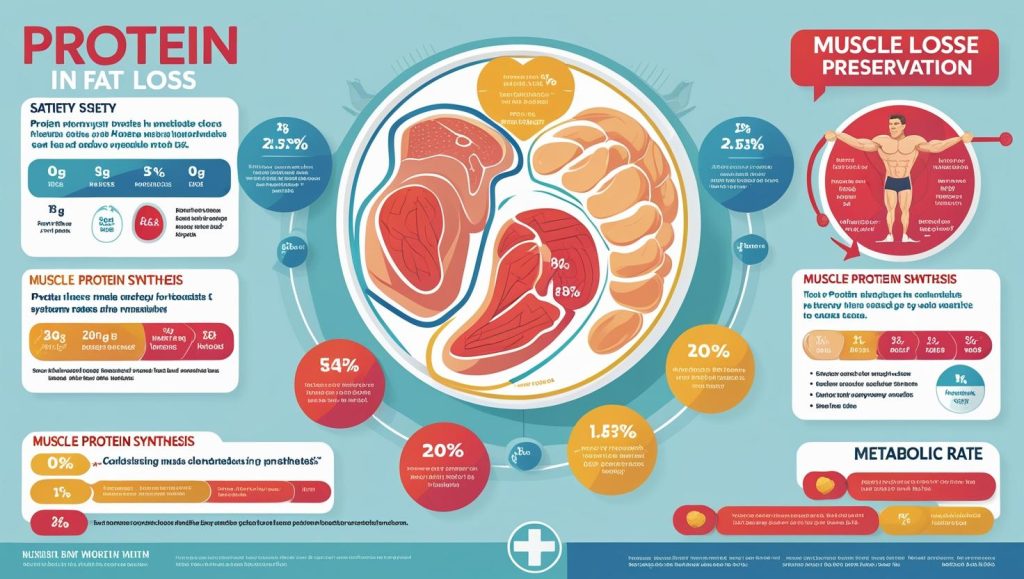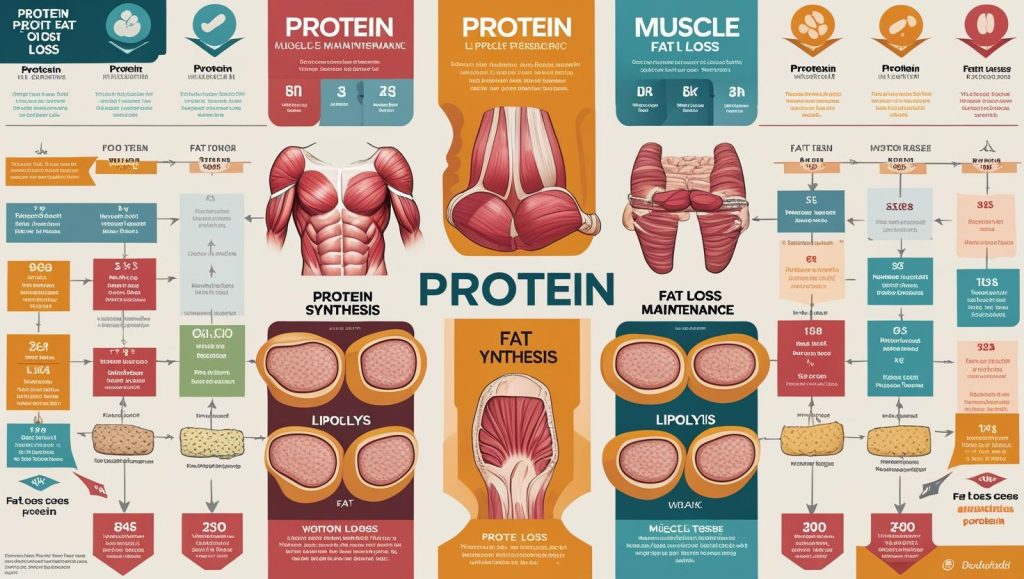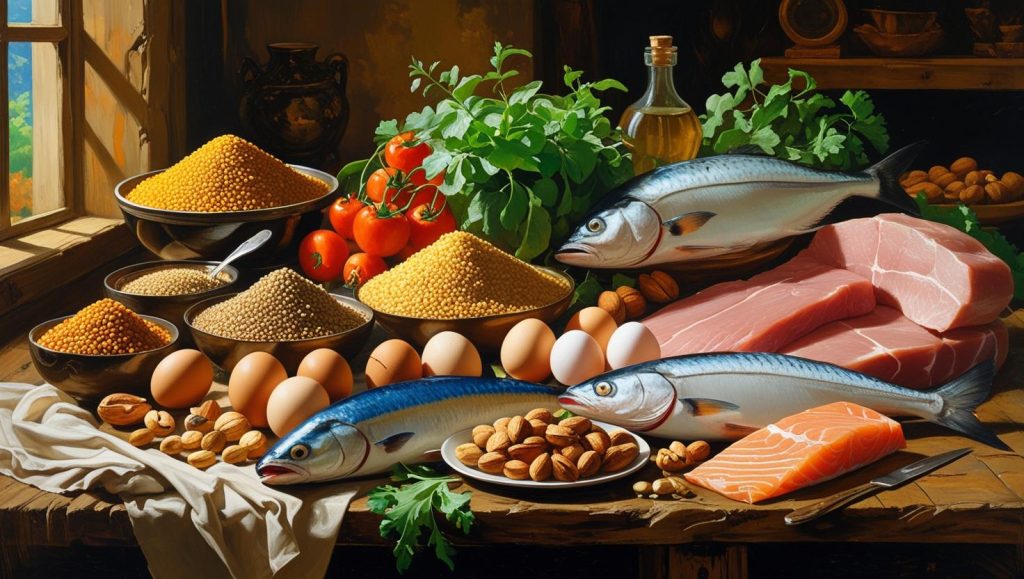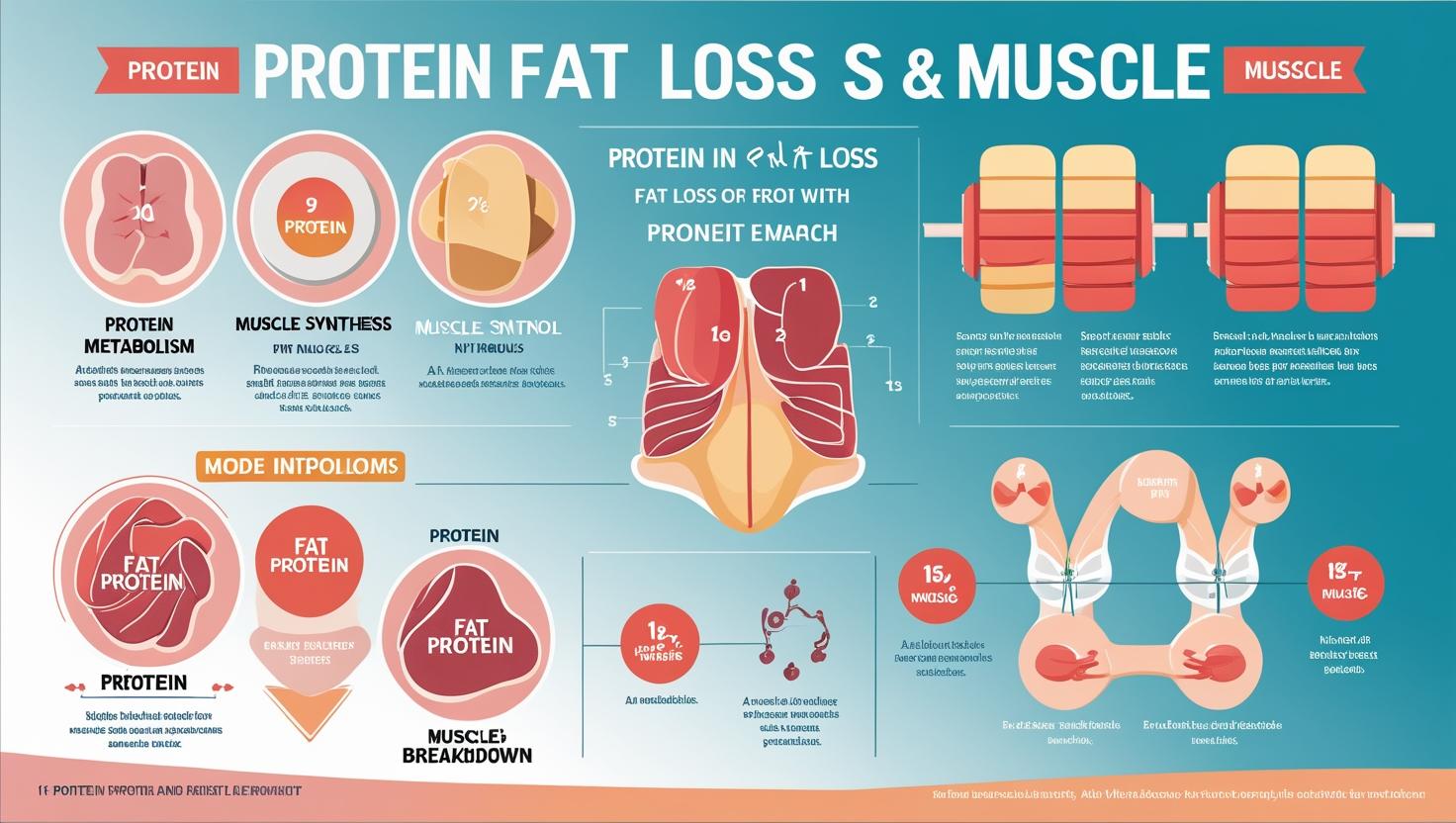When it comes to getting a leaner and healthier body, two main goals at the top of the to-do list tend to be: 1) lose fat and 2) keep (or even build!) the muscle you have. Different nutrients could influence all these results, although protein is a central player in both processes. Whether cutting calories on a weight loss diet or lifting weights daily to gain some much-needed muscle, your protein intake will majorly affect your results. But why is protein so essential, and how does it play a role in losing fat and maintaining muscle? Let’s explore.
What Is Protein?
Protein is 1 of 3 macronutrients your body needs (carbohydrates and fat are the other two). It comprises amino acids, which form your body’s tissues (including muscles, skin, enzymes, and hormones).
Your body doesn’t store protein the way it stores fat or carbohydrates. So you need to get a constant supply through the diet to replace and repair body tissues , particularly when you are losing weight or doing strenuous activity.
The Science of Fat Loss
To drop fat, you must be in a caloric deficit, eating fewer calories than your body is burning. This causes your body to pull from stored energy sources (namely, fat) to meet your energy needs. But if your diet is low in protein, your body might break down lean muscle tissue on top of fat, which is not what you want.
Protein Aids in the Preservation of Lean Muscle

When you have a calorie deficit, your body needs to choose where to get its fuel from: fat, muscle tissue or glycogen (stored carbs). Eating sufficient protein tells your body that it isn’t necessary to lose muscle while it is burning fat.
Here’s how:
Muscle Protein Synthesis (MPS): Protein fuels Muscle Protein Synthesis (MPS) – the process of creating new muscle mass. As long as you’re eating adequate protein (and, ideally, lifting weights), you can spike MPS, even in a caloric deficit, and preserve or even increase lean body mass.
Prevents Muscle Catabolism: When you don’t get enough protein, your body can go into muscle-wasting mode, especially when working out. Consuming enough protein can decrease this and safeguard your precious muscle mass.
Post-Workout Recovery: Protein supports your body after workouts by repairing micro-tears that occur in your muscles when lifting weights. This allows you to recover more easily and quickly and get on with the next workout. The quicker you recover, the more often and harder you can train, which will help you lose fat.
Protein Fills You Up and Reduces Appetite
Another reason protein is so effective for fat loss is that it reduces hunger and increases fullness.
- Satiety Hormones: Protein consumption boosts hormones like peptide YY and GLP-1 that signal fullness to your brain.
- Decreased Ghrelin: It lowers ghrelin levels, a hormone that makes you hungry.
- Reduced Portions: You’re likely to eat fewer calories over the day after eating a high-protein meal simply because you’re full.
In other words, less protein can help you eat more calories without ever realizing it, without that constant willpower battle.
Higher Thermic Effect of Food (TEF)
Did you know that your body burns calories just by digesting food?
This is known as the Thermic Effect of Food (TEF). Among the macronutrients:
- Protein has the highest TEF (20–30% of its calories are burned during digestion),
- Carbs have a TEF of 5–10%,
- Fats have a TEF of 0–3%.
This means that if you consume 100 calories of protein, about 20–30 calories are used to process it, giving you a metabolic advantage over carbs and fats.
How Much Protein Do You Need?

Another unfortunate misunderstanding: The Recommended Dietary Allowance (RDA) for protein, 0.8 gram per kilogram of body weight, is the absolute minimum necessary to maintain health, not an optimal amount for fat loss or muscle preservation.
The majority of research agrees that a higher intake is best if you are active or when in a calorie deficit:
- 1.2-2.2 grams per kg body weight
- Or about 0.6 to 1 gram per pound
- For example, a 150-pound person trying to sustain muscle while losing weight should strive for 90 to 150 grams of protein a day.
- Your needs might be different, depending on:
- Activity level
- Age
- Gender
- Exercise mode (resistance vs. cardio)
- Total calorie intake
Best Sources of Protein

Not all protein is created equal. Shoot for the full spectrum of all nine essential amino acids: high-quality, complete proteins.
Animal-Based Protein
- Chicken breast
- Lean beef
- Eggs and egg whites
- Turkey
- Greek yogurt
- Fish (salmon, tuna, cod)
- Cottage cheese
Plant-Based Protein
- Tofu and tempeh
- Lentils and beans
- Quinoa
- Chia seeds
- Edamame
- Plant-based protein powders
Integrating a variety of plant proteins at different times of day can help optimize amino acid intake for vegetarians or vegans.
When to Eat Protein
The timing of protein can help maximize its muscle-saving benefit:
- Space protein evenly during the day to maintain a consistent anabolic stimulation.
- To help your muscles repair, you should include a strong protein source in both pre- and post-workout meals.
- Protein at bedtime, like casein or cottage cheese, can support overnight muscle repair.
- Protein and Changing Your Body
- Lower-protein diets and resistance training almost entirely mediate body recomposition (losing fat, gaining muscle).
Even if you’re not in a calorie deficit, a higher protein intake combined with weight lifting can shift your body composition toward more muscle and less fat, creating a leaner and more defined appearance.
Common Myths About Protein
Here are some misconceptions and some suggestions:
- Myth 1: High protein is complex on your kidneys.
- Fact: A high protein intake does not harm healthy kidneys. People with preexisting kidney problems should consult a physician.
- Myth 2: The more protein, the more muscle.
- The truth: Protein on its own won’t turn you into the muscles-from-steel poster child; you need a training stimulus (e.g., lifting weights) to actually see and feel anything.
- Myth 3: Getting enough protein on a plant-based diet is impossible.
Reality: By planning, people who don’t eat animal products can meet their protein needs with various legumes, grains, and supplements.
Final Thoughts
Protein’s power is twofold in fat loss and muscle preservation, so protein should be the foundation of any practical fitness or weight-loss program. It keeps you full, promotes recovery, jacks metabolism, and prevents you from losing amazing lean muscle as you lose that less desirable fat.
To build muscle without looking skinny or weak, prioritize protein. Throw in some weight training, steady sleep, and intelligent calorie control, and soon enough, you’ll be on your way to a stronger, leaner you.
Ready to get started?
Log your daily protein intake, strive for balance in your meals, and feel the difference protein can make not only on the scale, but in how strong, full,l and energized you feel each day.
